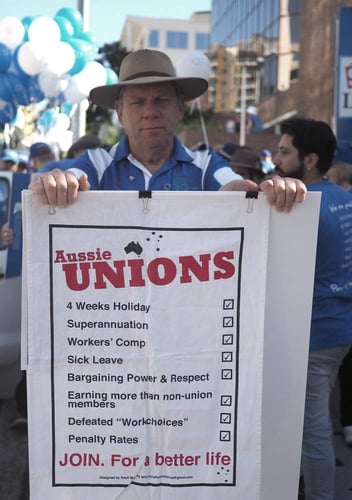Response to “The Strangling of Small Business” by Elizabeth Colman
Response to “The Strangling of Small Business” by Elizabeth Colman
Friday 22 July 2016
Ros McLennan
General Secretary
Queensland Council of Unions
rosm@qcu.asn.au
(07) 3010 2555
It was very interesting to read the article in Friday’s Australian (The Strangling of Small Business — 22 July 2016) regarding the long suffering Mark Scanlan (Senior Vice President of the bosses’ union Restaurant & Catering Industry Association (RCA) – a position the journalist Elizabeth Colman didn’t see fit to mention) and his urgent plea for reductions in penalty rates for the sake of his business and his workers.
Again we here pleas of help for the long suffering owners of business like Mr Scanlan. “Cutting penalty rates isn’t about us. Help us help workers!” they cry.
But there is one issue that any discussion about cutting penalty rates should not be allowed to avoid: cutting penalty rates means a cut to the wages of more than one million of Australia’s lowest paid workers.
A full-time job should be enough to live on. But as it is, too many Australian full-time workers and their families are living below the poverty line. Many of these Australians work in hospitality and retail and many of these workers depend on penalty rates to make ends meet; to pay their rent, electricity bills, food bills, mortgages. We already have too many working poor in Australia. I honestly fail to see how lowering the wages of Australia’s lowest paid workers will solve any of Australia’s economic problems.
Mr Scanlan says it is outrageous that he has been forced to close his Kirribilli restaurant on Sunday nights and public holidays for the last four years.
First, many cafes and restaurants place a surcharge on public holiday and Sunday dining. Has he tried this? It is within his rights, and many customers (including myself) are happy to pay. Has he determined the North Shore and Kirribilli customers of Mr Scanlan’s restaurant unable or unwilling to pay an extra $3 for the $26 “fish and chips” from his restaurant.
Second, opening a store whenever you want to is not an entitlement. Perhaps this is another time when free marketeers ask for everyone to accept the vicissitudes of the market, except when it negatively impacts on them.
But this isn’t even the issue. Mr Scanlan has closed his restaurant on Sunday nights and public holidays.
Mr Scanlan says he is making the same revenue as seven years ago — again because of penalty rates for some reason! While I empathise with Mr Scanlan his situation is not unusual. Many workers have gone through exactly the same thing with the latest the Household, Income and Labour Dynamics in Australia (HILDA) Survey showing that household disposable incomes have stagnated since 2009 and disposable income is exactly the same money people would use to spend in his restaurant.
Essentially, Mr Scanlan believes that because his take home income has reduced, the only solution is to reduce the take home pay of his workers.
Since 2008 the rent for his Kirribilli establishment would only have increased so I am always exasperated when businesses are so quick to mount a million-dollar campaign to cut the pay of workers than mount an expensive media campaign against commercial property owners.
He pays just over $1 million in payroll. How much does he pay in rent?
Finally, if you needed more revenue I would think the last thing you do was take extra money from people more likely to spend it in the local economy — workers.
The truth is that Mr Scanlan is making a profit. A healthy one. However, he is not making enough profit to afford the lifestyle he thinks he is entitled to, and that’s his real issue.
“For every dollar I take I pay 50c in wages” he says in The Australian.
The resentment in his attitude to paying wages is phenomenal (those thieves!)
Mr Scanlan has been on this quixotic quest to cut the wages of Australian workers for more than four years. He and the other prophets of doom from the RCA are like apocalyptic preachers, always having to adjust their date for the end of the world because it simply never comes.
What about the story about Rio Capurso – the owner of the Noosa eatery Locale?
This December 2013 article in The Australian started with “Rio Capurso, the owner of Noosa’s new Italian eatery Locale, expects to begin 2014 by losing money.”
In 2013 he was complaining about losing money because of penalty rates. Checking his website today – the Locale restaurant is still owned by Rio, and opens DAILY from 12pm.
“If only penalty rates were cut we would offer more work” is the catch cry of Mr Scanlan and the RCA, but will the additional work offered be enough to cover the loss of wages and how much extra profit will be generated for these philanthropic bosses only concerned about their employees’ welfare?
Even within the Productivity Commission review which recommended the reduction of penalty rates they said – “The strongest economic argument for regulating penalty rates on weekends, rather than letting markets determine the rate, is that employers would tend to use their greater bargaining strength to set weekend pay rates that were lower than the efficient level.”
The one thing people like Mark Scanlan never mention when they talk about cutting wages is the workers. How they will live. What they deserve. What is fair to them. It is only about their bottom line – which is doing just fine. And if profits do suffer you will find that penalty rates were more often than not the least of their problems.
I wish Mr Scanlan well in his quest, but just like the boy who cried wolf I think he will find that his restaurant has been there for 20 years and will probably be there for another 20 more; and as Australian members and their unions continue to fight back, they’ll still be paying penalty rates.


